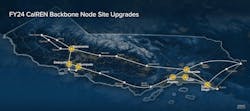CENIC wraps backbone upgrade with 400G handoffs to CalREN
CENIC (Corporation for Education Network Initiatives in California) is conducting an ongoing upgrade program for the California Research and Education Network (CalREN) backbone, including capacity increases to coastal and inland backbone routes to 400 Gbps.
These upgrades enable CENIC to support advanced optical services such as flex-grid spectrum services, allowing users to send far more data per wavelength with less equipment, power, and rack space.
Additionally, CENIC announced successful validations of the ZR+ and ZR Bright coherent pluggable optics – without and with integrated amplifiers, respectively – between the Los Angeles and Sunnyvale node sites over the CalREN production network. These validations demonstrated the utility of the latest generation of coherent pluggable optics for big-data applications over long distances.
The next phase of CENICs’ backbone program includes upgrading major node sites to support native 400 Gbps handoffs from member institutions, beginning with the San Diego node site located at the San Diego Supercomputer Center (SDSC) at UC San Diego. The Sunnyvale, Emeryville, Sacramento, Riverside, Tustin, and Los Angeles node sites are scheduled to be completed through this fiscal year.
While the CalREN backbone could support 400 Gbps of data traffic, that traffic could only enter the backbone in 100 Gbps increments. For example, a researcher wishing to send or receive data via 400 Gbps services would have to connect to the CalREN backbone via four 100 Gbps links. With this upgrade to the San Diego backbone node site, a user connected at that site can now use one 400 Gbps link.
Frank Würthwein, SDSC Director and Professor in the Department of Physics and at the Halıcıoğlu Data Science Institute at UC San Diego, sees great benefit to California’s big-data research community. “While the first science driver for 400G is experimental particle physics in collaboration with Caltech’s Harvey Newman, we see many other disciplines in the wings, from astronomy to cybersecurity research to genomics to neuroscience, and of course, Artificial Intelligence across them all,” he said.
Robert Kwon, CENIC Vice President of Engineering, agreed and added that the new network capability allows the research community to do more with less. “With this series of upgrades, CENIC can deliver cost-efficient and higher bandwidth connections for both the CalREN backbone and member connections.”
Besides supporting researchers by making high-capacity handoffs possible, these upgrades also ensure that CalREN can scale significantly. Instead of each 100 Gbps of traffic occupying one physical port at a backbone node site, each port can now accept 400 Gbps of traffic. This frees up ports that can connect other users by moving more data with much less equipment, rack space, and power.
For related articles, visit the Optical Tech Topic Center.
For more information on optical components and suppliers, visit the Lightwave Buyer’s Guide.
To stay abreast of optical communications technology, subscribe to Lightwave’s Enabling Technologies Newsletter.
About the Author
Sean Buckley
Sean is responsible for establishing and executing the editorial strategy of Lightwave across its website, email newsletters, events, and other information products.

